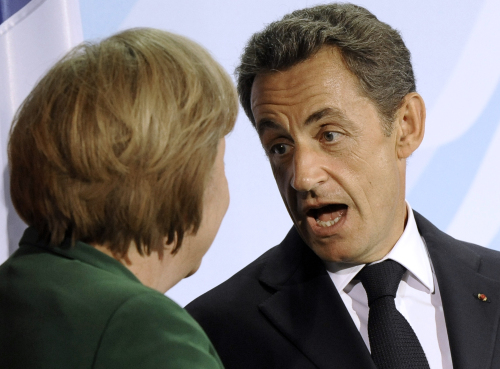BRUSSELS (AP) ― Europe’s efforts to solve its escalating debt crisis plunged into disarray, after Germany and France could not bridge their differences in time for a summit Sunday, forcing them to call a second meeting.
Sunday’s summit was supposed to deliver a comprehensive plan to finally get a grip on the currency union’s debt troubles by detailing new financing for debt-ridden Greece, a plan to make Europe’s banks fit to sustain worsening market turbulence and a scheme to make the eurozone bailout fund more powerful.
The offices of French President Nicolas Sarkozy and German Chancellor Angela Merkel announced Thursday that they needed more time after it became clear that the currency union’s two biggest countries could not agree on the main points of the plan.
Both governments said that all elements of the eurozone’s crisis strategy would be discussed on Sunday “so it can be definitively adopted by the Heads of State and Government at a second meeting Wednesday at the latest.’’
 |
French President Nicolas Sarkozy (right) reacts to German Chancellor Angela Merkel after a meeting on the financial crisis in Berlin on Oct. 9. (AP-Yonhap News) |
It also said that the two leaders would meet Saturday evening ahead of the summit in Brussels in the hope of making progress.
“The chancellor is confident that in this way good, coordinated measures for the stability of the eurozone can be achieved,’’ Merkel’s spokesman Steffan Seibert told journalists in Berlin.
The announcement of a second summit is likely to increase concern over the eurozone’s ability to stick together and stabilize the common currency. Sunday’s summit had already been delayed from earlier in the week to give the leaders more time to agree on the key issues.
“The parochialism and procrastination that got us into this mess continues,” said Sony Kapoor, managing director of economic think tank Re-Define. “Unless EU leaders pull a rabbit out of their hat now, this will worsen the already deep politico-economic crisis that Europe is facing.”
European officials said ahead of the announcement that the eurozone remained deeply divided on important parts of its strategy on debt-ridden Greece, banks and its bailout fund.
Germany and several other rich countries have been pushing for banks and other private investors take steeper losses on their Greek bondholdings, before the eurozone can sign off on a second multibillion euro rescue package for the struggling country.
France and the European Central Bank have so far opposed forcing banks to write off more Greek debt, fearing that would destabilize the banking sector and worsen market turmoil.
But Greece’s international debt inspectors warned earlier in the day that even under a rescue package tentatively agreed in July the country’s debts were not sustainable.
In their statements Thurday, Merkel and Sarkozy said that ―based on the inspectors’ report ― Greece should immediately start negotiations with the private sector to reach a deal “that would improve this debt sustainability.’’
The eurozone is also divided on how to give its bailout fund more firing power, with the French wanting the ECB to help out, which Germany opposes.
A third point of contention is how to fund expensive capital injections into weak banks that might take losses on Greek debt and have already taken a hit from falling prices of other government bonds. France and several other countries are worried that bailing out their banks could hurt their credit rating and want the bailout fund to support lenders directly, rather than lending first to governments.
Ahead of the announcement, one European official, who was speaking on condition of anonymity, suggested that the need for more time may also have been caused by disagreement between Merkel’s government and the German parliament, which felt that decisions affecting taxpayer money were being taken over its head.
Seibert appeared to support that assessment, saying further changes to Europe’s bailout fund would require the agreement of the Bundestag, the German parliament.
“A two-step summit allows for this to take place,’’ Seibert said.
Merkel’s address to parliament scheduled for Friday was canceled, and Seibert said it would take place next week.
Governments in rich and poor countries are finding it increasingly difficult to get their parliaments to support the common rescue efforts.
Greek lawmakers late Thursday barely passed a deeply resented austerity bill needed to get the next batch of rescue money and avoid a disastrous default next month.
But the vote further diminished the ruling Socialists’ grip on parliament and triggered violent protests on the streets of Athens, leaving one person dead and dozens injured.
Tear gas choked the air in Athens’ central Syntagma Square as riot police tried to separate more than 50,000 peaceful protesters from smaller groups determined to wreak havoc with firebombs and stones. The scene degenerated into running battles between groups of protesters beating each other and between helmeted, heavily armed police and masked rioters.
One central Athens hospital said it had treated 74 people injured in the clashes. Some of the injured were covered in blood from head wounds.




![[Herald Interview] 'Trump will use tariffs as first line of defense for American manufacturing'](http://res.heraldm.com/phpwas/restmb_idxmake.php?idx=644&simg=/content/image/2024/11/26/20241126050017_0.jpg)

![[Health and care] Getting cancer young: Why cancer isn’t just an older person’s battle](http://res.heraldm.com/phpwas/restmb_idxmake.php?idx=644&simg=/content/image/2024/11/26/20241126050043_0.jpg)

